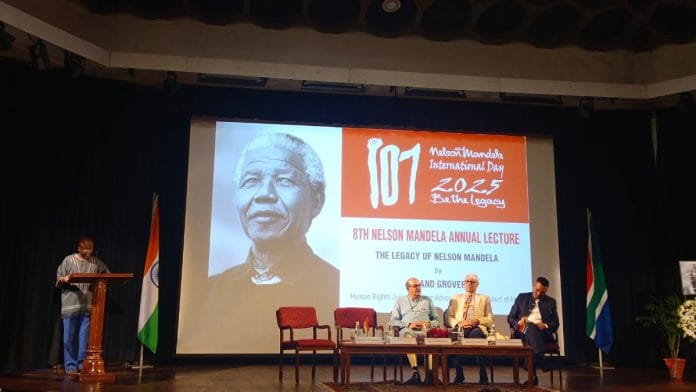New Delhi: Nelson Mandela’s legacy does not belong to the past—it belongs to the present and the future. This was the message from the 8th Annual Nelson Mandela Lecture, held on 18 July at the India International Centre to mark Nelson Mandela International Day.
Speakers from India and South Africa reflected on Mandela’s vision, leadership, and continued relevance at a time “when hate and division persist across societies.”
“Mandela was a man who taught us that reconciliation is not weakness but wisdom,” said Anand Grover, senior advocate at the Supreme Court of India and human rights jurist.
The event brought together diplomats, students, human rights advocates, and educators to commemorate the life and legacy of the anti-apartheid South African leader widely known as “Madiba.”
Other speakers at the lecture, which was instituted in 2018 to mark Mandela’s birth centenary, included Suhas Borker, Convener of the Working Group on Alternative Strategies, and Anil Sooklal, High Commissioner of the Republic of South Africa.
Delivering the opening remarks, Borker recalled his involvement in the anti-apartheid movement. He spoke of joining the cause in 1987 and participating in the ANC’s International Solidarity Conference.
Citing Long Walk to Freedom, Borker quoted Mandela: “No one is born hating another person because of the colour of his skin, or his background, or his religion. If they can learn to hate, they can be taught to love.” This formed the theme of the event.
Mandela’s legacy
In his keynote, Grover examined Mandela’s strategic approach to justice and reconciliation and asked today’s lawyers to learn from his wisdom.
“His passion for justice, his persistence and patience with the opponent—something that lawyers have to learn,” Grover said.
Grover also explained that, while deeply influenced by Gandhi, Mandela understood that sometimes strategy had to evolve. After events like the Sharpeville massacre, Mandela came to believe that exclusive reliance on peaceful protest was no longer enough. Yet, even then, his use of violence was measured and deliberate, never losing sight of reconciliation as the ultimate goal.
“Mandela used non-violence not just as a principle, but also as a tactic,” he added.
Grover placed Mandela alongside Gandhi and Martin Luther King Jr., citing American philosopher Martha Nussbaum, who identified all three as leaders who transitioned from righteous anger to “non-anger”—a crucial step in nation building and reconciliation.
“Their strength was not in the suppression of anger, but in its transformation into unity and healing,” he said.
Also read: Dalai Lama’s sister is the subject of new documentary. ‘She nurtured a generation in exile’
Mandela’s vision
Mandela’s life symbolises the struggle for justice and human dignity. His philosophy of Ubuntu (collective humanity) continues to inspire movements for change around the world.
Mandela’s vision extended far beyond South Africa. In 1997, he boldly declared, “Our freedom is incomplete without the freedom of the Palestinians.”
This statement has reverberated through history and found renewed meaning in 2024, said Grover. When South Africa brought a case before the International Court of Justice, accusing Israel of genocide in Gaza, the quote was cited by Justice Minister Ronald Lamola in court.
“His vision was a legacy rooted in ethical resistance, reconciliation, and the unwavering belief in justice and dignity for all,” said Sooklal.
Nelson Mandela’s leadership transcended national boundaries. He spent 27 years in prison for resisting apartheid, and upon his release, he chose peace and democracy over revenge.
“To be free is not merely to cast off one’s chains, but to live in a way that respects and enhances the freedom of others,” Grover said, reading Mandela’s words aloud.
(Edited by Theres Sudeep)






